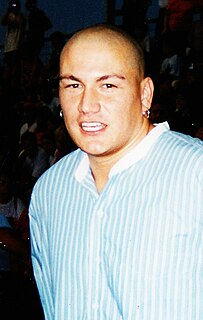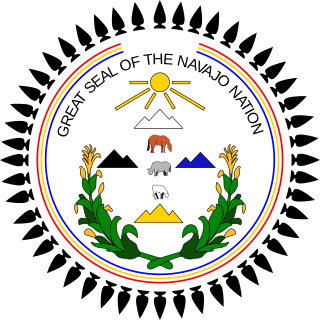
The Crow, whose autonym is Apsáalooke, also spelled Absaroka, are Native Americans living primarily in southern Montana. Today, the Crow people have a federally recognized tribe, the Crow Tribe of Montana, with an Indian reservation located in the south-central part of the state.

The Navajo Nation is a Native American territory covering about 17,544,500 acres, occupying portions of northeastern Arizona, northwestern New Mexico and a smaller portion covering southeastern Utah, in the United States. This is the largest land area retained by a Native American tribe in the United States. In 2010, the total population of Navajo tribal members was 332,129 with 173,667 living within the boundaries of the reservation and 158,462 tribal members outside of the reservation. Metropolitan areas accounted for 26 percent of the population, border towns accounted for ten percent, and the remaining 17 percent were living elsewhere in the U.S. The seat of government is located in Window Rock, Arizona.

The Bureau of Indian Affairs (BIA), also known as Indian Affairs (IA), is a United States federal agency within the Department of the Interior. It is responsible for implementing federal laws and policies related to American Indians and Alaska Natives, and administering and managing over 55,700,000 acres (225,000 km2) of land held in trust by the U.S. federal government for Indian Tribes. It renders services to roughly 2 million indigenous Americans across 574 federally recognized tribes. The BIA is governed by a director and overseen by the assistant secretary for Indian affairs, who answers to the secretary of the interior.

Gary Paul Davis, better known professionally as Litefoot, is an American business professional, actor, musician, and a citizen of the Cherokee Nation. He is the Executive Director of the Native American Financial Services Association (NAFSA), CEO of Davis Strategy Group and a member of the Forbes Finance Council. As an actor, he is known for his roles as Little Bear in the movie The Indian in the Cupboard, and Nightwolf in Mortal Kombat Annihilation.

The Crow Fair was created in 1904 by Crow leaders and an Indian government agent to present the Crow Tribe of Indians as culturally distinct and modern peoples, in an entrepreneurial venue. It welcomes all Native American tribes of the Great Plains to its festivities, functioning as a "giant family reunion under the Big Sky." Indeed, it is currently the largest Northern Native American gathering, attracting nearly 45,000 spectators and participants. Crow Fair is "the teepee capital of the world, over 1,500 teepees in a giant campground," according to 2011 Crow Fair General Manager Austin Little Light.

Citizen Potawatomi Nation is a federally recognized tribe of Potawatomi people located in Oklahoma. The Potawatomi are traditionally an Algonquian-speaking Eastern Woodlands tribe. They have 29,155 enrolled tribal members, of whom 10,312 live in the state of Oklahoma.

The Navajo Nation Council is the legislative branch of the Navajo Nation government. The council meets four times per year, with additional special sessions, at the Navajo Nation Council Chamber, which is in Window Rock, Arizona.
Indian Country Today (ICT) is a daily digital news platform that covers the Indigenous world, including American Indians, Alaska Natives and First Nations.
Edison Real Bird was the chairman of the Crow Nation Tribal Council from 1966 to 1972. While in that position, he implemented several key democratic reforms, and oversaw the election of Pauline Small, the first woman to be elected in the Crow Nation.
The Crow Tribal General Council, the governing body of the Crow Nation, through the adoption of the 2001 Crow Tribal Constitution, established a three-branch government with a separation of powers. There is an Executive Branch, Legislative Branch, and Judicial Branch.

Pauline Small was the first woman to be elected to office in the Crow Tribe of Indians. In 1966 she was elected to Vice-Secretary of the Crow Tribal Council, holding office de facto to 1972, and served in various positions within the Crow Tribal Offices, many to do with supporting education.

The Lower Brulé Indian Reservation is an Indian reservation that belongs to the Lower Brulé Lakota Tribe. It is located on the west bank of the Missouri River in Lyman and Stanley counties in central South Dakota in the United States. It is adjacent to the Crow Creek Indian Reservation on the east bank of the river. The Kul Wicasa Oyate, the Lower Brulé Sioux, are members of the Sicangu, one of the bands of the Lakota Tribe. Tribal headquarters is in Lower Brule.

The National Congress of American Indians (NCAI) is an American Indian and Alaska Native rights organization. It was founded in 1944 to represent the tribes and resist federal government pressure for termination of tribal rights and assimilation of their people. These were in contradiction of their treaty rights and status as sovereign entities. The organization continues to be an association of federally recognized and state-recognized Indian tribes.

Kimberly Teehee is an American attorney, politician, and activist on Native American issues. She is a Delegate-designate to the U.S. House of Representatives from the Cherokee Nation. She served as senior policy advisor for Native American affairs in the administration of President Barack Obama from 2009 to 2012. In February of 2020, she was named by Time as one of 16 activists fighting for a "More Equal America."

Neal A. "Chief" McCaleb is an American civil engineer and Republican politician from Oklahoma. A member of the Chickasaw Nation, McCaleb served in several positions in the Oklahoma state government and then as the Assistant Secretary of the Interior for Indian Affairs under President George W. Bush.

The Samish Indian Nation is a Coast Salish nation and a signatory to the Treaty of Point Elliott of 1855. Samish has a government-to-government relationship with the United States of America. The Samish are a Northern Straits branch of Central Coast Salish peoples. The Samish Nation is headquartered in Anacortes, Fidalgo Island, in Washington, north of Puget Sound.

The Skokomish Indian Tribe, formerly known as the Skokomish Indian Tribe of the Skokomish Reservation, and in its own official use the Skokomish Tribal Nation, is a federally recognized tribe of Skokomish, Twana, Klallam, and Chimakum people. They are a tribe of Southern Coast Salish indigenous people of the Pacific Northwest located in Washington. The Skokomish are one of nine bands of Twana people.
The Northwestern Band of the Shoshone Nation is a federally recognized tribe of Shoshone people, located in Box Elder County, Utah. They are also known as the Northwestern Band of Shoshoni Indians.

The United States public policy agenda on issues affecting Native Americans under the Obama administration includes the signing of the Tribal Law and Order Act of 2010, which allowed tribal courts to extend and expand sentences handed down to them in criminal cases, strengthening tribal autonomy. Obama also supported and enforced the Executive Order 13175, which requires the federal government to consult with tribal governments when deliberating over policies and programs that would affect tribal communities. Under the Obama Administration was also the launching of Michelle Obama's program Let's Move In Indian Country, which aims to improve opportunities for physical activity, to increase access to healthy food in tribal communities, and to create collaborations between private and public sectors to build programs that will end childhood obesity in Native communities. Obama also supported tribal communities through certain provisions of the American Recovery and Reinvestment Act of 2009, which allocated $510 million for rehabilitation of Native American housing, and the settlement of the Keepseagle case, a lawsuit against the United States Department of Agriculture for discriminating against tribal communities by not allowing them equal access to the USDA Farm Loan Program. Most recently, Obama signed Executive Order 13592, which seeks to improve educational opportunities for American Indian and Alaska Natives. Obama has been praised by many tribal leaders, including those who claim he has done more for Native Americans than all of his predecessors combined.

Fawn Sharp is a Native American politician, attorney, and policy advocate who currently serves as President of the National Congress of American Indians. Prior to serving in this capacity, Sharp served as President of the Quinault Indian Nation as President of the Affiliated Tribes of Northwest Indians, and as vice president of the National Congress of American Indians. Following the Cobell v. Salazar decision, Sharp was appointed by the Department of the Interior to serve as chair of the National Commission on Indian Trust Administration and Reform














